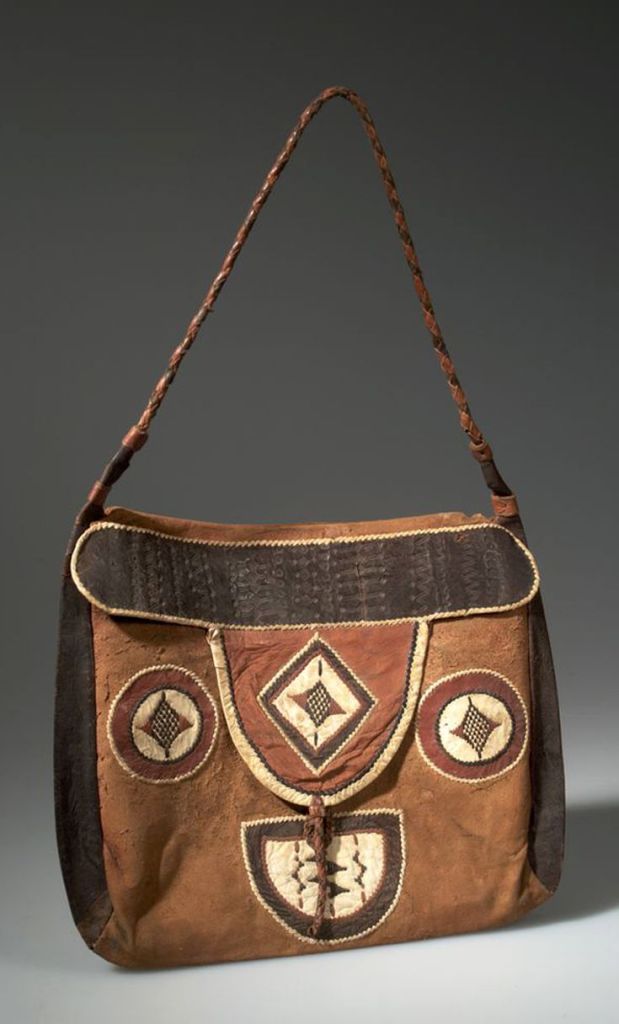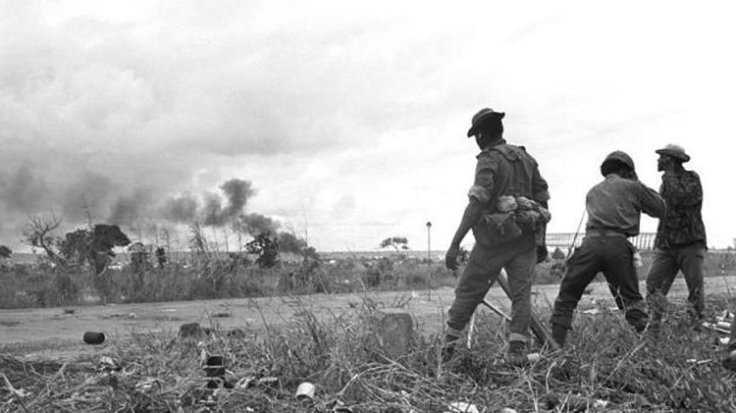For hundreds of years the ancient city of Kano in Northern Nigeria was a market city and starting point for caravans conveying goods and slaves to North Africa and the Middle East. It is still a center of handicraft and dyed cloth, and you can visit the indigo dyeing pits in the city today.

Kano used to be part of the Islamic empire known as the Sokoto Caliphate, founded in the beginning of the 19th century by Fulani scholar and jihadist revolutionary Usman Dan Fodio. The Caliphate was a pre-colonial center of manufacturing in West Africa. Colorful leather shoes and bags and blue textiles were a noted specialty of the region, exported as far away as Cairo. Many of these items were handicrafts produced by families in homes, or artisans in small workshops, and sometimes they were produced by slaves. Indeed, there was a manufacturing of sorts going on in pre-colonial West Africa: other kingdoms in what is today Ghana and Benin Republic manufactured items like guns and farming implements.


But does this mean that those African societies were capable of the type of world-changing industrial transformations that began in Britain, spread to continental Europe then the USA, and more recently, Asia? No, pre-colonial Sub-Saharan Africa lacked the conditions that make industrial take-off possible and this and the next posts will show why.
It is important to remember that industrialism—and the stupendous wealth and prosperity it creates—is a new phase in human history, and the period of its existence is but the blink of an eye when seen against the 200,000 years homo sapiens has been on earth. Britain was the first nation to usher in the age of machine and fossil fuel powered industrial production. The extraordinary explosion in manufactures it generated temporarily propelled Britain beyond any other nation on earth. From the time it began the difficult and costly process in the middle of the 18th century to the middle of the 19th, Britain had no European competitor in wealth created by factory-based manufacturing. In the words of David Landes, author of The Unbound Prometheus, one of the classic histories of the Industrial Revolution, “[Britain] was…the very model of industrial excellence and achievement—for some, a pace-setter to be copied and surpassed; for others, a superior economic power whose achievements rested on the special bounty of an uneven Providence, hence a rival to be envied and feared.”
Britain dominated the world in the production of cotton cloth and various other manufactures. Other European nations sent spies to English factories to figure out these incredible machines that produced such vast quantities of cheaper but superior cotton textiles. European governments sent representatives to factories to study how they were organized, and private businessmen came to visit and learn, though what they were permitted to see was sometimes limited. Many of these visitors tried to entice British factory workers with promises of higher wages to come to Continental Europe to teach workers there. Continental Europeans tried to copy and emulate, many times without success. These French, German and Dutch observers went back to their countries to write and disseminate information about what they had seen in the British factories.
But what was happening in Africa at this time? Is there any evidence anywhere that Africans were preparing for industrial take-off in the second half of the 18th century, or even in the 19th? The short answer is no.
For one thing, the Atlantic Slave Trade was still going on when England and continental Europe began to industrialize in the 18th and 19th centuries, and it is hard to imagine industrial take-off in areas where this slave trade was happening. This may seem like a confirmation of Joseph Inikori’s claims but this is mistaking consequence for cause. Slavery is a consequence of weakness, not a cause of it. The Europeans came to Africa for slaves and to colonize the continent because it was a backward part of the world; the Europeans did not cause this backwardness. And there are far too many unindustrialized countries that did not experience Atlantic slavery—some in Africa—for it to be an obvious reason for the failure of West African countries to develop economically.
There were conditions that existed in West Africa that precluded any form of industrial take-off, whether a Trans Atlantic Slave Trade existed or not.
An important one is that many of the societies of tropical West Africa were fragmented tribal entities. A tribe can be defined simply as a group “of people who trace their descent to a common ancestor.” My own tribe was known as “Umuoshie,” or the descendants of Oshie, a pre-colonial confederation of villages in northern Igbo territory that banded together for war and other forms of mutual help. Tribes usually consist of a few hundred, maybe a thousand or more people; they are often sedentary, and live near their farms or pastures (many large African ethnic and language groups are often misidentified as tribes). Most precolonial West African tribes were small acephalous societies, that is, without centralized state authority.
Oral traditions and written histories suggest that raids, skirmishes and wars were a regular part of existence in these areas. This is not unusual and is typical of tribal societies all over the world (All human societies were once tribal). Tribal existence is fraught with unpredictable violence between tribes, and this is so everywhere, whether the tribal people be Viking raiders in Europe, Yanomamo villagers in South America, or Fulani cattle herders in West Africa. Of course, there were a few West African kingdoms and chiefdoms like Benin, Oyo, Ashanti and Dahomey, but the majority of communities were tribal confederations and villages. They had traditional enemies, and, as if they were playing home and away football games, raided each other for slaves and trophy heads in tit-for-tat attacks. The British missionary and anthropologist George T. Basden, who spent 36 years in Igboland before and after colonization, wrote: “In common, I suppose, with all savage peoples, the Ibos, prior to the British occupation of the country, occupied their spare time with fighting, generally town against town. The evil of this was not so much the bloodshed, but rather the paralysing of trade and intercourse.”
For this, and many other reasons, it was practically impossible for such societies to industrialize—no tribal society has ever made that direct leap. Industrial and industrializing societies and regions require internal peace and stability for obvious reasons. No one wants to invest or risk the large sums required to build factories and buy expensive machinery in an environment of raiding, kidnapping and incessant tribal war. In a region in which retainers were sometimes sent out by chiefs and rulers to go and waylay people and engage in banditry, in which raiding for slaves was common and thought to be normal and acceptable, how could industrialization take place? Such unstable conditions will also limit the movement of labour needed to meet the demands of expanding factory production.
All societies that industrialized were strong unified nation states at the time. This is because most industrialization has been achieved with strong state involvement. During industrialization, the state creates markets, laws, infrastructure like roads, ports and other large country-wide investments that facilitate the growth of industry. As Nobel economist Joseph Stiglitz observes in the January-February 2020 issue of the journal Foreign Affairs, “Most economists rightly emphasize the role of the state in providing public goods and correcting market failures, but they often neglect the history of how markets came into being in the first place. The invisible hand of the market depended on the heavier hand of the state.” There were no nation states in West Africa to employ that “heavier hand” before the colonialists created them, only loose confederations of ethnicities with no economic specialization and no capable bureaucracy.
Even today, many of the states in Africa are artificial colonial creations: they are weak collections of ethnic entities which often struggle with unity and therefore peace. In many West African states, the difficult task of creating strong nation states out of diverse bickering ethnicities is still begging to be tackled. It is one of the biggest obstacles to the creation of industrialized countries.
Many African countries have been riven by wars and ethnic conflict since independence. In West Africa, there have been major civil wars in Nigeria, Liberia, Sierra Leone, Ivory Coast and Guinea-Bissau. In the Central African Republic, there is an ongoing civil war that began in 2012.
In Nigeria alone, the most populated African country, there has been all manner of disorder and ethnic strife. The colonial British left the country in 1960, and six years later, there were two military coups followed by savage ethnic riots against Igbo-speaking people living in the North of Nigeria. This led to a secession attempt by the East of the country, ancestral home of the Igbo. War broke out as the Federal Nigerian Government sought to impose unity by force. Known as the Biafran War, the terrible civil war lasted 30 months with the loss of an estimated 2 million people, most of them children.


The list of ethnic and religious troubles in Nigeria is long—the Boko Haram insurgency, the rampaging Fulani cattle herdsmen who raid villages and farms and massacre inhabitants with impunity as if Nigeria is still a tribal society, the low-intensity ethnic-environmental insurgency (now mostly quiet) in the oil-producing Niger delta, and various religious-ethnic flare-ups such as the intermittent riots and killings that happen in the city of Jos.

In such a situation of continuous strife, industrialization is very unlikely if not impossible. The parlous situation in Nigeria is no doubt a carry-over from tribal life, stubborn remnants of an age that should have been dead and buried. The country remains a disunited collection of ethnicities and the constant bickering and conflict reflect this. This is what must be dealt with first before we consider any possibility that Europe is “underdeveloping” Africa.
SOURCES
Armed and Aimless: Armed groups, guns and human security in the ECOWAS region by Nicolas Florquin and Eric G. Berman
The West African Slave Plantation by Mohammed Bashir Salau.
The Industrial Revolution: Smithsonian/ Great Courses lectures by Patrick N. Allitt.
The Industrial Revolution in World History, by Peter Stearns
The Unbound Prometheus: technological change and industrial development in Western Europe from 1750 to the present by David S. Landes
The Making of an Economic Superpower: Unlocking China’s secret of rapid industrialization, by Yi Wen
The Industrial Revolutionaries: the making of the modern world, 1776-1914, by Gavin Weightman
The World Until Yesterday by Jared Diamond
The Origins of Political Order: from prehuman times to the French Revolution by Francis Fukuyama
The Better Angels of our Nature: why violence has declined, by Steven Pinker
War Before Civilization; the myth of the peaceful savage, by Lawrence Keeley
Eke Oshie Anugwu by Humphrey Aniago
Igbo Worlds by Elizabeth Isichei
Among the Ibos of Nigeria by G. T. Basden
Baba of Karo by Mary Smith
The Gospel on the Banks of the Niger by Samuel Crowther and John Christopher Taylor
A Chronicle of Abuja by Hassan and Shuaibu
Happy New Year! If we accept what you say as to be true, then the question is this: what led to Sub-Saharan Africa being underdeveloped in the first place? The literature I’ve read typically blame infertile soils, disease, and the presence of the tsetse fly for Africa’s underdevelopment. As well as byproducts of under population and the Atlantic and Arab slave trades. What do you think the “root cause(s)” is?
LikeLike
Hi Dave, Happy New Year to you too. Hope you had a good Christmas Season.
Can I suggest something? I think you should go back to my very first post and read right through to the most recent. I try to explain my views sequentially, so that if you have not read what I wrote earlier, you might miss some explanations of my views.
The reasons why West Africa is underdeveloped are complex and varied (my site title notwithstanding), and some of the reasons you gave–infertile soils, disease, tsetse fly–may be part of it. But I also have mentioned in earlier posts that what we call “underdevelopment” is the “natural” or default condition of mankind, and all peoples were at one time in the not-too-distant past “underdeveloped.” Through accidents of history, geography and intercourse between societies, forced and otherwise, some people were able to do better. Modern wealth and prosperity are also of very recent vintage. It takes time for such things to spread.
It is important to note that people who lived in isolation or relative isolation tend to be backward. While you may think Africans were not isolated because of slavery and colonialism, the fact is that European culture did not penetrate the interior until the 19th century. Furthermore, West Africa had no technology for disseminating and discussing new information and ideas–much of West Africa was non-literate.
These are some of the reasons. There are others which will be discussed in later posts.
LikeLike
My friend; I just wanted to commend you for what you have written on this blog. I only found it through, ironically, being lambasted by the today all to commonly available afrocentric identitarians. Not to worry, or please do, its also on the rise in my knack of the woods, Western Europe.
I recognize the bravary in your writing, the frustration, the good and empathetic intentions and the beautiful and most important traits of indvidualism and self-reflection. I’m well-versed on many things you write about as a conscious West-European, I’m pretty lonely in this regard I’m afraid, but in the limited quantity of your posts… you have taught me so much.
Information and lessons I wish with all my heart many of my fellow African or black brethren, I dont like these distinctions but it is what it is, would see and internalize. It will do them so good. It could even pull them loose from the, in my opinion, top-down system of self-sabotage due to mental enslavement put on them and everyone for that matter. Devised by a visible but hidden distinct ‘elite’ whatever it may be.
So thank you. You havent written in a while. I dont know the reason for this but I suppose it goes back to thr frustration I quoted earlier. The ego-driven cognitive dissonance is heavy, on all ‘sides”.
Be proud of your mental position in the increasingly crazy and frankly inuman realm we find ourselves in. Thanks again. I wish I could show this to those who really need it.
LikeLike